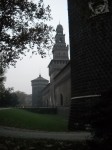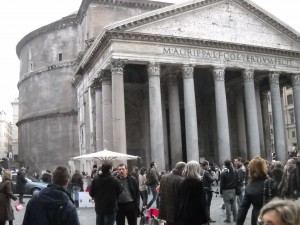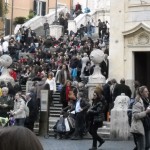My current view of Genesis is wrapped up in a song which was written by Charlie Chaplin. Yes, the comedian, Chaplain, who knew so well how life could be (“I know why the world is smiling / Smiling so tenderly / It hears the same old story / Through all eternity / Love this is my songâ€). In this post, we shall attempt to render the significance of the book of Genesis to modern-day Christians (the Lord’s people).Â

- street vendors
The route to church in Milan, which Marla and I take on Sunday mornings, goes right past the Italian vendors. Sunday morning is a time for the coin dealers, stamp-collectors and artists to display their works. The photograph (adjacent) shows the paintings of life in Italy. It is this sense of story (history/storia) which overlaps with the lovely and often tragic stories of the book of Genesis.
What we do with Genesis is extremely important. In my opinion, Genesis will influence your understanding of Romans.  In my Romans study (2008), I found myself relying on the phrase, “the human experience.â€Â Recently, one, Angela, asked why the players in Genesis (God’s people) were so troubled. Little did she know that that observation is a huge insight into our own experience, as well. In the Italian, sin is peccato. So, when one says, “Peccato che,†the phrase becomes, “What a pity!â€Â Yes, peccato (sin) is a sad concept in Genesis: indeed, what a pity.  But, it is not only sad in the book, it is sad in the cross. A fascinating study might be to trace the tears in the Genesis text; the tears at the cross; and, the tears in your own soul. That is not at all to negate the joy. Genesis is packed with laughter, surprise, and overwhelming burgeoning of happiness too!  Jesus, also, exhibits the whole gamut of emotions in the gospel accounts, that is, in his own human experience.
Genesis condenses well into Italian with a package of five words beginning with the letter “Pâ€: Paradiso; Popolo di Dio; Peccato; Passione and Promessa [Paradise, People of God, Sin, Passion, Promise]. In fact, the Genesis drama may be understood along these lines with significant progress being taken in understanding what this ancient book is all about. Angela’s notes on Jacob (Israel), for example, find meaning not as a random story, but as a Hebrew heritage. This is a heritage which applies to all who have the ability to understand the matter (Be sure to see Galatians 3:7, 29; 4:19; 6:16; and Romans 4:16!).
Michelangelo said something meaningful: “Io citico costruendo, quel cosa de bello†[I criticize by creating something more beautiful.]  The application being that when you encounter the pain of peccato in your own life, do realize that even though it ends with a sarcophagus in Egypt, the promise remains, “Surely I will visit you!†And, again, “Then Joseph made the sons of Israel swear saying, God will surely visit you†(Gen. 50:24-26).
 Job 42:1,2 reads: “Then Job answered the Lord and said, I know that you can do all things, and that no purpose of yours can be thwarted†(ESV).
Job 42:1,2 reads: “Then Job answered the Lord and said, I know that you can do all things, and that no purpose of yours can be thwarted†(ESV).





 material position of the world is that it is strongly tilted toward a set of presuppositions which exclude outside forces (namely the Lord God) from the git-go.   That is why, when people sometimes state, “I believe in Science,” they are actually admitting to a higher power that is observable. An immediate problem here involves the nature of God being spirit, not chemical or a mere force field (John 4:24). So, end of discussion, right?
material position of the world is that it is strongly tilted toward a set of presuppositions which exclude outside forces (namely the Lord God) from the git-go.   That is why, when people sometimes state, “I believe in Science,” they are actually admitting to a higher power that is observable. An immediate problem here involves the nature of God being spirit, not chemical or a mere force field (John 4:24). So, end of discussion, right? anyway? For, to think as Jesus thought, to feel as he felt, and to see as he saw , we will need to acquire his set of beliefs (or, belief system). John 5:17 captures this assumption in a few words. Jesus believed that the Father was at work in the world, and that he was also involved in this magnum opus. When the gospel is preached and people respond in baptism, they are raised by the power of God out of the watery grave of Christian baptism. This is the Lord’s continuation of John 5:17. This is furthermore a call to believers to participate in the work of God (opera in Italian), by submitting to his plan. If it begins here, commencing in baptism, it takes the believer far away and yet nearer to the one who calls. This may be seen in Philippians 1:6, where the work of God in history has high continuity with John 5:17 and Colossians 2:12.
anyway? For, to think as Jesus thought, to feel as he felt, and to see as he saw , we will need to acquire his set of beliefs (or, belief system). John 5:17 captures this assumption in a few words. Jesus believed that the Father was at work in the world, and that he was also involved in this magnum opus. When the gospel is preached and people respond in baptism, they are raised by the power of God out of the watery grave of Christian baptism. This is the Lord’s continuation of John 5:17. This is furthermore a call to believers to participate in the work of God (opera in Italian), by submitting to his plan. If it begins here, commencing in baptism, it takes the believer far away and yet nearer to the one who calls. This may be seen in Philippians 1:6, where the work of God in history has high continuity with John 5:17 and Colossians 2:12. exclusively to Columbus, Galileo, or Fermi. The sub-atomic level may appear random; neutrinos, for example. But, the speed of light is still a constant (300,00 kilometers per sec.). Dare to participate in the drama. Jesus will meet you there (Jn. 5:17; Col. 2:12; Phil. 1:6). Pronto?
exclusively to Columbus, Galileo, or Fermi. The sub-atomic level may appear random; neutrinos, for example. But, the speed of light is still a constant (300,00 kilometers per sec.). Dare to participate in the drama. Jesus will meet you there (Jn. 5:17; Col. 2:12; Phil. 1:6). Pronto?